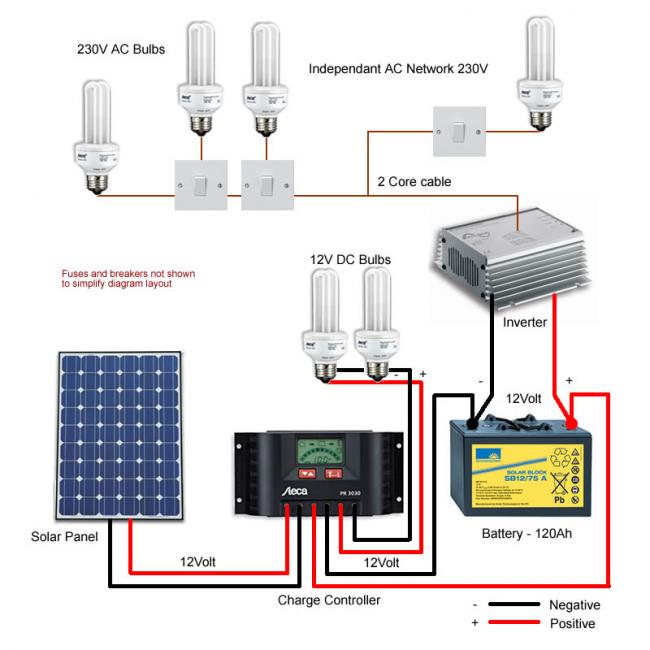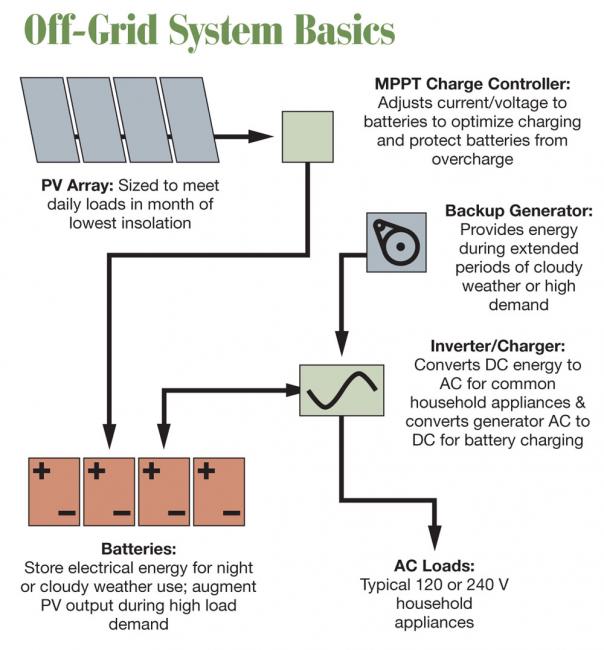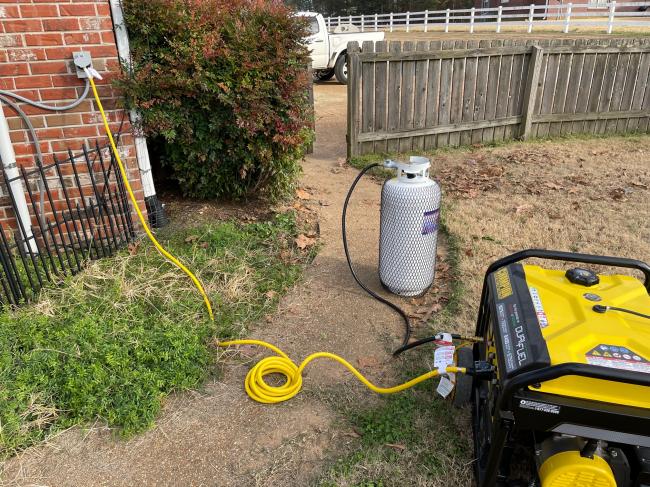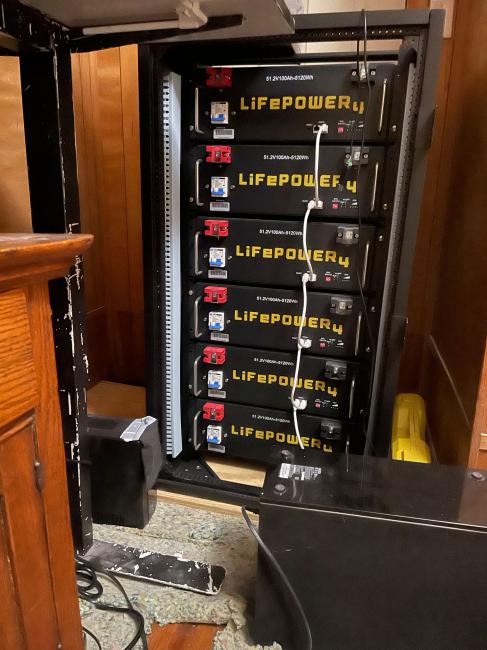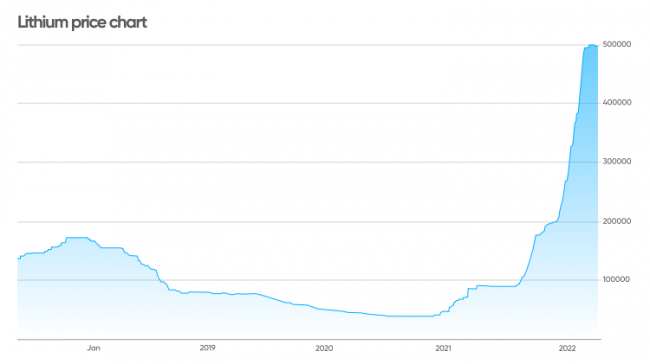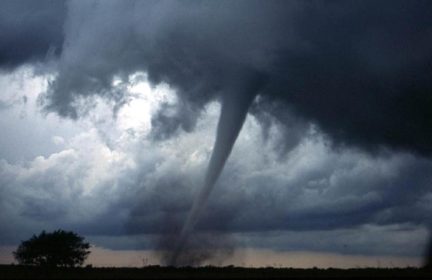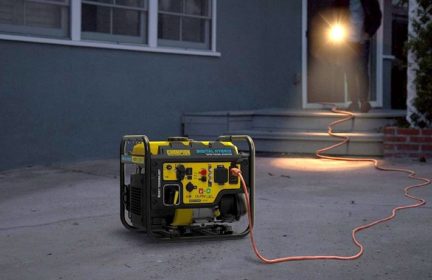Do I need more than a whole house generator?
I have a natural gas line into my home and a 22kw whole house generator that automatically kicks on when the electricity goes out. It can easily power everything in my home, including my gas furnace (necessity) and my whole house a/c (a nice luxury during a summer outage). The primary worries in my area are winter storms and high-wind storms (including tornados, although I don’t live in “tornado alley.”) My question: “redundancy” seems to be a key concept in prepping, and I’m beginning to wonder if over-reliance on my generator for heat and electricity is wise. Thoughts?
-
Comments (16)
-
AndyO - April 10, 2022
I have a similar setup (but 16kw) and similar risk characteristics. I do have a backup to my backup. For heat, a Mr Heater with a few days worth of propane. For at least some power, I have an EcoFlow Delta Pro with a solar panel (50 ft cables so I can keep it inside but have the panel move around a bit outside if needed.) I also have a smaller EcoFlow River for portability that uses the same panel – I store it in a faraday bag. It doesn’t completely backup the whole house generator, but it’s something and it’s portable and doesn’t rely on a utility company being operational. I’m planning to add more portable solar panels as my next step.
-
jaybee - April 11, 2022
I was thinking about a Mr. Heater yesterday, but then I started wondering if I was going overboard – which led to my post!
-
-
Bill Masen - April 11, 2022
If your funds allow it may be prudent to diversify your off grid system if YOU deem you need it. EG keep the generator, but install a back up battery system.
Power goes off Generator kicks in, runs the house AND charges the battery bank. So if the generator fails the battery bank will supply power to the house.
From there you could add a PV array to the system, and perhaps a micro wind turbine or VAWT to provide total backup.
A lot of preppers on limted budgets would install PV or wind turbines, micro hydro etc on a LESS than full house system, to run only core essentials (Freezer, Lights, Only One or Two Outlets ) and perhaps only a couple of liesure batteries.
This can be backed up with other things like a wood burning stove in the lounge and a wood burning oven to cook on. You could also back up with a bottled propane portable fire / stove and spare refillable bottles.
If your water is PUMPED to your house by the utility company or from your own well, You can reduce the load on your power system by having an oversize or second water tank if roof will take the extra weight, to reduce the load on the generator / batteries.
-
jaybee - April 11, 2022
Can you talk a bit more about a “battery bank”? I’m a newbie!
-
Bill Masen - April 11, 2022
OK Battery bank, A series of batteries connected togther to STORE energy produced by a Generator/ Wind Turbine/ Water Wheel/ PV Panel array etc.
When the mains power goes OFF,( OR if you are living off grid) you can manually or automatically switch from MAINS to your offgrid system.
The Commonest are a bank of 12 Volt DC deep cycle lead acid batteries. they are usually stored in an outhouse or shed away from the house.
Stored 12 VDC cab be used to power 12VDC cordless tools, or 12VDC liesure goods designed for RVs like 12VDC kettles, coffee makers, microwaves, pumps, washing machines LED lighting etc but used in the home instead of the RV.
( I know of preppers/offgridders whose entire homes are 12VDC ONLY, no 110AC. )
OR
You can use the stored 12VDC power through an INVERTOR ( pref FULL WAVE) to convert it to 220VAC (UK) or 110VAC (US) to power your ESSENTIAL equipment at home ie Lighting and FREEZER etc.
-
-
RedneckContributor - April 11, 2022
I would most certainly add a Mr. Heater, but not just for redundancy. Sometimes you might want to rest the generator overnight and the heater could allow you to do so. This is especially important if a prepper is using a smaller, portable generator. But redundancy is important. In the winter, with below freezing temps, having backup power is super nice, but having heat is critical. A Mr. Heater will keep you warm no matter what your generator does. Those heaters are absolutely amazing & sure helped us out this winter when my mother-in-law lost power for a few days.
I used to have a large whole house generator but after about 12 years, it is now dead. It required lots of maintenance and when the expensive transfer switch went out, I said enough. Now I just have a portable dual fuel generator & am very pleased. It is cheaper & easier to maintain & service, but the biggest advantage is flexibility. Twice this winter my mother-in-law had multiple day power outages in Memphis, and I was able to bring the generator & associated gear (MR. Heater included). Can’t do that with a whole house generator. I’ve used the generator once this winter at my house.
If I were to do it all over again, I would not get a whole house generator. I’d purchase two portable dual fuel generators and wire the panel accordingly. I would simply have two plug in receptacles at the back of the house as opposed to one. That way I could power as much as a whole house generator. Then if I had a generator failure, I wouldn’t lose the whole house. It would also provide the flexibility to use a generator elsewhere.
-
jaybee - April 12, 2022
It’s very interesting to think about all this, while still taking into account our own unique situations. I thought a lot about a portable generator, but as a single female I realized wrestling a heavy generator through the snow, and storing lots of gas in an urban area, was not the best case scenario for me. But I can see the advantages of portable generators, and why you prefer them.
-
RedneckContributor - April 12, 2022
As far as storing fuel, keep in mind you can get portable generators that run on natural gas, which you have. I have a dual fuel generator that runs on LP gas & gasoline. You can get tri fuel generators that run on gasoline, LP gas & natural gas. I like the flexibility of being able to use multiple fuel sources but if you won’t be taking the generator elsewhere, it would be cheaper for you to just get a natural gas model.
As for wrestling the generator, yes the bigger models are fairly heavy but with the 4 wheels & pull handle, anyone can move them on a paved surface. In my case, my electric panels are in my garage, so I mounted the plug on the outside garage wall. I store my generator inside the garage. To use the generator, all I have to do is wheel it out of the garage & on he parking apron. No need to go cross country. Usually, I pull it into the side yard, behind the garage but it will work out front just as well.
-
-
Colorado Jones - April 11, 2022
Thanks for starting the thread, jaybee! This has been a very informative discussion.
One other thing you might think about is this: How many neighbors are in earshot of your generator, and does them knowing you have one pose a security risk? I know, for example, in my densely populated urban neighborhood that running a noisy gas-powered generator during an extended power-outage would probably send the wrong message to my neighbors. Once I get to the point of working on off-grid power for my preps, I’ll likely stick with stuff that’s a bit lower-profile like propane, solar, backup batteries, etc.
-
jaybee - April 12, 2022
I live close to a major US city – so I’ve thought about this. From the manufacturer: “The generators we offer produce around 66 dB standing at 23 feet – a standard distance for measuring generator sound output – which isn’t particularly high. That noise level compares to around 68 dB for air conditioners 20 feet away and 70 dB for washing machines at a similar distance.”
-
Bill Masen - April 12, 2022
The last genny I saw the owner had it exhausting into a barrel of water to quiet it down.
-
jaybee - April 12, 2022
Interesting!!!!
-
-
Pops - April 11, 2022
The first thing that will run out in any emergency is fuel (ask the Russians) that is if the emergency isn’t fuel availability itself (ask the Europeans). Figure what you have is all you’ll have.
I had a house with a 20K Generac and 500 gal propane tank, in town. The former owner was one of those weird “prepper” types LOL. All the heat was baseboard electric. Even though it was pretty mild on the Columbia river, that tank would have gone in a flash. I sold the gen and bought/converted a couple of small hondas that can be run in tandem to dual fuel. 3.8kW using both and 7-800 using just one @ half capacity. Eventually I’ll be somewhat off-grid and those will be back-up to my back-up which will be solar PV.
We’ve since moved from the Cascades to the Ozarks and are currently in a small rural town. We’re on town power, gas, water, not my preference but we’re kinda waiting out the real estate bubble before we build the final resting place, LOL.
I just bought a rack of these:
That’s over 30kWh of battery; 6x100Ah @ 48v nominal.
For scale the average US household consumes about 3kWh/day, giving this bank an 8-day supply using 80% of the charge. In an emergency we would not be using the electric water heater or clothes dryer, not much of anything really, we’d likely be in “stealth mode” and mainly powering a small fridge to keep my insulin chill.
The battery bank costs a lot of money in absolute terms, right at $9k before taxes/shipping/rack. BUT that works out to about $30 per Kilowatt/hour at actual voltage. Again, for perspective, this story from December ’21 pegs lithium ion at $1,200 kWh in 2010 and today at $132. As the big graphic on the batteries says, these are Lithium, Iron, Phosphate chemistry, cheaper and less prone to fire and explosion. But they are 48 volts and have a low internal resistance which means they have a huge energy potential so one needs to be careful with proper fusing and wire gauge. (the reason to use the higher voltage is because wires and equipment are sized by amperage and the higher the volts the lower the amps for a given amount of power—and right now copper is gawd-awful expensive)
Right now this is just a big battery backup. I bought a 120v charger and a 1,500 watt inverter for a few hundred bucks. And that is what I’m getting around to suggesting, a big back-up. Even one of these batteries, a small number of solar panels and a charger/inverter could be had for $2500 and would give about the same output as my little Honda generator… with no consumables. I would use the little gennies for special tasks, long run of cloudy weather etc., until the gas/LPG ran out.
There is any range of power you could imagine with a solar set-up. A small DIY RV package would probably be the best deal, the so called “solar generators” all seem way overpriced and underpowered to me—they would be better than nothing though. I have an all-in-one charge controller, inverter, transfer switch rated at 6.5kW and 3300w of pv panels. I’m not going to deploy them at this location however, that is unless the real estate bubble doesn’t pop as I expect and we’re stuck here longer than planned.
-
Pops - April 12, 2022
P.S. Batteries and panels are at an all time low price right now due to increasing scale. With the price and supply problems of fossils being top of the worldwide mind, not to mention climate change, I expect alternative energy to be in high and increasing demand from here on out.
Because of that high demand, and the seemingly constant global shipping crisis, the metals and chips required to make these batteries & panels are seeing huge increases in cost.
Need I mention general inflation?
I’m just some guy on the internet, no expert at solar, economics or crystal balls. But I have been reading and watching the whole alt energy scene for a long while. To me this looks like the best time to jump in: price of the technology at the lowest and just at the cusp of a huge demand spike. I really found some great deals.
Hiring a pro to design and install is still pretty costly, 2-3x the material cost I’ve read. But you don’t need to be an electrical engineer to DIY anymore. You can buy all-in-one units that handle the switching, conversion, charging of batteries and eliminate a large amount of the connections. There is lots of info online but I won’t tell you it is necessarily easy.
On the flip side, all the above mentioned snags could disappear tomorrow and system prices may continue to fall. DIY does have a learning curve and takes some aptitude.
-
Bill Masen - April 12, 2022
Shipping a container of PV panels has risen from $200 to $2000 , and that is if you can find a container, and a ship.
-
Pops - April 12, 2022
Yes! Supply fluctuates a lot. Just when I thought I had the right panel/charger/inverter/battery combo one or more was sold out, unavailable, on backorder, etc. I was on a wait-list for a large electrical part for weeks, first to be built because China was having trouble getting chips, then to be shipped, then it sat in port on the west coast for another couple of weeks waiting on a semi to haul it to the distributor in Utah. Getting it the last 800 miles to here via FEx was the easy part.
-
-
- Shot Show 2026 recap - 1 month ago
- News for the Week 2026-1-12 - 1 month ago
- News for the Week 2026-01-05 - 2 months ago
- News for the Week 2025-12-29 - 2 months ago
- News for the Week 2025-12-22 - 2 months ago
This forum is heavily moderated to keep things valuable to as many people as possible. Full community policies are here. The basics:
- 1. Be nice to each other.
- 2. Stay focused on prepping.
- 3. Avoid politics, religion, and other arguments.
- 4. No unfounded conspiracies, fake news, etc.
- 5. Debate ideas, not people.
